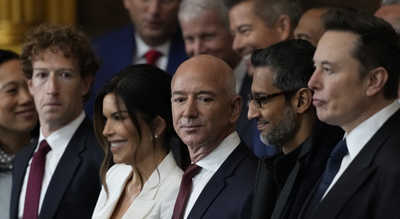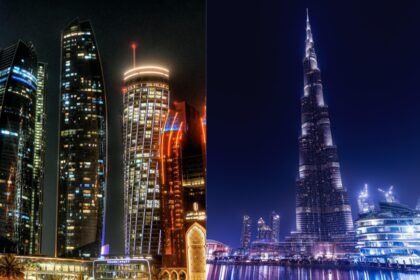The world has an odd relationship with American wealth. It resents it, borrows from it, copies it, and yet, inevitably, revolves around it. Each time the global economy shifts, whether through inflation, trade wars, or a technology crash, the United States somehow emerges with more billionaires, more ultra-rich individuals, and a stronger gravitational pull on global capital. The latest data from Altrata’s World Ultra Wealth Report 2025 lays this bare in numbers almost too large to grasp: America now houses 38 percent of the world’s ultra-high-net-worth population, more than the combined share of the next ten nations. This is not a one-off statistical anomaly but a structural dominance. The United States has accumulated an extraordinary $22.3 trillion in private wealth held by just 192,470 individuals worth over $30 million each, a class of people whose fortunes collectively outstrip the GDP of entire continents. Despite political volatility, fluctuating markets, and a trade policy defined by tariffs and confrontation, the number of ultra-rich Americans surged by 21 percent last year alone. China, its nearest rival, holds just $5.9 trillion across 54,020 individuals.In addition to the US and China, the top 10 countries in terms of ultra-wealthy population include Germany, the United Kingdom, Japan, Hong Kong, Canada, France, Italy, and India, with the US far surpassing them in both total wealth and billionaire concentration.
The resilience of American capital
There is a peculiar kind of resilience baked into the American economy. Even when Washington imposes tariffs or restricts global trade, policies that, in theory, should stifle growth, the US finds new ways to profit from the disruption. Part of this stems from its diversified corporate ecosystem: Silicon Valley’s tech giants, Wall Street’s financial behemoths, and a robust private equity network that thrives on volatility rather than stability. Altrata’s research suggests that deregulation, tax incentives for the wealthy, and an extraordinarily dynamic stock market have allowed America’s richest to continue compounding their gains. Trump-era policies, criticised abroad as isolationist, often ended up fuelling domestic wealth creation. Reduced corporate taxes widened margins for American conglomerates and, in turn, expanded the net worth of their founders and shareholders. Technology, in particular, has been the great multiplier. Of the world’s five richest people, Elon Musk, Larry Ellison, Mark Zuckerberg, Jeff Bezos, and Larry Page, all are American, all are products of the digital age, and all have created economic ecosystems around their companies. Musk’s $500 billion net worth alone symbolises this new era of tech-driven dominance, where innovation, capital, and state influence intersect seamlessly.
The rest of the world can’t keep up
The imbalance is stark. Even as Asia, Europe, and the Middle East diversify their economies, they have not come close to replicating the United States’ billionaire machine. China, once seen as the inevitable challenger, has stalled. With trade conflicts tightening and export restrictions weighing down its tech sector, China’s ultra-wealthy population has expanded only marginally. Altrata records a clear deceleration, a signal that state control and market dynamism still make uneasy companions. Europe, meanwhile, has crossed the 1,000-billionaire threshold for the first time, a symbolic milestone that pales in comparison to America’s 1,135. The continent’s wealth growth, though steady, lacks the risk appetite that defines US capitalism. The same volatility that unnerves regulators elsewhere is what keeps American enterprise alive.Altrata’s Billionaire Census 2025 offers another lens: North America’s billionaire population, dominated overwhelmingly by the United States — rose by 7.8 percent last year to 1,198 individuals, lifting its global share to 34 percent. Of these, 1,135 are American, reflecting how deeply the region’s wealth is concentrated in the US The combined worth now exceeds $13 trillion, greater than the market capitalisation of Apple, Microsoft, and NVIDIA combined.
A system that rewards the bold and risk takers
If there is a secret to America’s endurance, it lies in the way its system rewards audacity. American wealth creation has always been speculative, future-focused, and deeply individualistic. Venture capital flows freely, failure is survivable, and regulation tends to follow innovation rather than precede it. In that environment, capital compounds exponentially. By contrast, Europe’s wealth is old and institutional; Asia’s, new but constrained. American wealth remains entrepreneurial — and that makes all the difference. Even as global asset markets fluctuate and inflation tests every portfolio, the US continues to produce billionaires at a pace no one else can match. In 2024 alone, Altrata found that 10 percent of those worth between $1 billion and $2 billion globally dropped below that threshold. Yet in America, new entrants filled the gap almost immediately. That churn, that continuous regeneration of fortunes, is what defines the US advantage. It is not merely about size but renewal. The billionaire class in America does not remain static; it evolves alongside the technologies it funds and the markets it disrupts. There is an irony in all this. The United States, often criticised for inequality, remains the most effective wealth incubator in human history. Its share of the global ultra-wealthy may rise or fall slightly year to year, but the structure of its economy, open, competitive, and aggressively capitalist, ensures it never loses its lead for long. Tariffs, trade wars, or populist rhetoric may change the mood, but they have not changed the maths. As long as American innovation outpaces the rest of the world, and its financial system remains the global engine of liquidity, it will continue to dominate the billionaire game. It is fashionable to predict the end of the American century. But in the numbers, $22 trillion in private ultra-wealth, 38 percent of the world’s richest, and a billionaire population still rising faster than anyone else’s, the century looks far from over.






